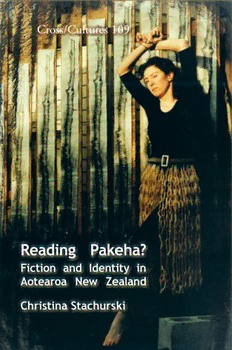
Reading Pakeha?: fiction and identity in Aotearoa New Zealand PDF
Preview Reading Pakeha?: fiction and identity in Aotearoa New Zealand
Reading Pakeha? C ro ss Readings in the Post / Colonial ultures Literatures in English 109 Series Editors Gordon Collier †Hena Maes–Jelinek Geoffrey Davis (Giessen) (Liège) (Aachen) Reading Pakeha? Fiction and Identity in Aotearoa New Zealand Christina Stachurski Amsterdam - New York, NY 2009 Cover image: Margaret Dawson, “Victor’s Delusion” (1987; colour photograph) Courtesy of Jonathan Smart Gallery (Christchurch, New Zealand) and the artist. Cover design: Pier Post The paper on which this book is printed meets the requirements of “ISO 9706:1994, Information and documentation - Paper for documents - Requirements for permanence”. ISBN: 978-90-420-2644-5 E-Book ISBN: 978-90-420-2645-2 © Editions Rodopi B.V., Amsterdam – New York, NY 2009 Printed in The Netherlands To Patrick Evans and Howard McNaughton, scholars and gents Contents Introduction ix A white settler society? xi Myths of identity xvii My approach xx Relevant literary critical discourse so far xxx Why focus on Man Alone, the bone people and Once Were Warriors? xl Literary masculinity xli Feminist novels xlv Maori writing in English xlv Man Alone 1 The explorer model 2 Landscape as sign 12 Masculinity 17 Nature, culture, and ethnicity 30 Conclusion 34 the bone people 37 Social and cultural context 39 Alienation from Maoritanga 48 Tiaki 52 The three protagonists 53 Sex as metaphor 55 Transformation of nature 59 Kerewin 61 Joe 80 The sanitization of Irishness 86 Conclusion 94 Once Were Warriors 97 Warriorhood 98 Social and cultural context 115 Reviewers’ responses 127 Colonization 131 Libertarianism 138 Alan Duff 142 The female reader 145 The film 150 Conclusion 168 Conclusion 173 Works Consulted 177 Index 199 Introduction I am theirs and of them and for them speak. My hands have gone over the roofs and gullies of their names. These hills I live under are their doing. I have been given what they got. I am what they became.1 “I’m Polish.” “I’m half English and half Irish.” “I’m Scottish.” A T PRIMARY SCHOOL, this sort of conversation came up often. There, in the playground in the 1960s, no-one thought to say “I’m a New Zealander” or “I’m Pakeha.” We knew about New Zealand from the native birds and creatures on Weetbix cards and coins, and the coloured pictures of scenic wonders inset along our standard-issue wooden rulers. Every year, the class (including its Maori members) studied “The Maoris” as history and made the same models of traditional meeting houses out of ice-block sticks. This shallow knowledge of my country paled beside the settings of books I read growing up, series after series by the English Enid Blyton, the American Bobbsey Twins and Nancy Drew, and L.M. Montgomery’s Canadian Anne and Emily books. There were no New Zealand children’s books in our small local library and it seemed that New 1 Michael Jackson, “Pioneers,” in An Anthology of New Zealand Poetry in English, ed. Jenny Bornholdt, Gregory O’Brien & Mark Williams (Auckland: Oxford UP, 1997): 120 (ll. 20–25).
